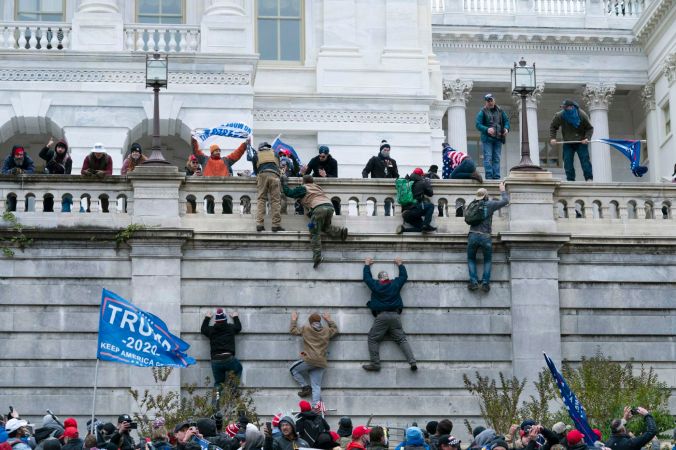
Supporters of Pres. Trump climb the wall on the West Wing of the U.S. Capitol after overrunning police barricades. Photo by Jose Luis Magana, AP.
I just finished another interview about the historic parallels between the attack on the U.S. Capitol last week and the violent overthrow of Wilmington, N.C.’s city government by white supremacists in 1898.
It has been a busy week for scholars of American history.
Across the country, journalists and the general public alike have been looking to U.S. history to try to understand better last Wednesday’s events, when Pres. Trump’s supporters laid siege to the U.S. Capitol in order to overturn the results of a fair and democratic election.
Many Americans are searching for historical context in order to make sense of what happened at the U.S. Capitol. Again and again, they look to the racial massacre and coup d’etat in Wilmington in 1898, when white supremacists overthrew a duly elected government and took power.
Those events in Wilmington have long been known as the only successful coup d’etat in American history.
A few days ago, Hunter Ingram at the Wilmington Star News wrote a compelling story comparing the two moments in American history– the insurrection at the U.S . Capitol last week and Wilmington in 1898. The Associated Press picked up Hunter’s story and newspapers ran it all over the U.S.
On NBC, MSNBC, CNN and NPR, other stories about the mob at the U.S. Capitol also mentioned Wilmington in 1898.
Even comic Seth Myers referenced the Wilmington massacre and coup d’etat of 1898 on his late night show on NBC.
Reporters at The Washington Post, The Philadelphia Inquirer, Baltimore Sun and the Raleigh News & Observer also wrote stories that focused on the similarities between the events at the U.S. Capitol and Wilmington in 1898.
Quoting my friends Glenda Gilmore at Yale and Debra Dicks Maxwell in Wilmington, as well as the gifted filmmaker Chris Everett, the BBC in Great Britain just published a story on Wilmington in 1898 too.
Grasping for a way to understand the assault on the U.S. Capitol, even articles on the on-line editions of Teen Vogue, Smithsonian Magazine, Esquire and National Geographic looked to the white supremacy revolt in Wilmington.
On Esquire’s on-line edition, the African American novelist Mitchell S. Jackson wrote:
“To be astounded by what happened Wednesday is to be ignorant of what happened in Wilmington, North Carolina in 1898 when a mob of 2,000 white supremacists, upset that Blacks had been elected to a fusion government, overthrew it, killing 60 people—the only coup d’état on American soil.”
For decades I and many others have been working to bring the story of the Wilmington massacre and coup d’etat out of the shadows. Few historical events, if any, shaped North Carolina more profoundly. My colleagues and I believe that recognizing that history is essential to understanding and overcoming our current racial divisions and building a better America.
I could never have imagined what happened last week at the U.S. Capitol. I could also never have imagined that such a shameful moment in America’s history would be what finally led the country to look closely at the racial massacre and coup d’etat in Wilmington in 1898.
I guess that is a small blessing, a silver lining in all this horribleness. But I have to confess that it does not feel very gratifying, especially not while armed troops still guard the nation’s capital against forces that want to overthrow our democracy, as did the white supremacists in Wilmington all those years ago.
As a friend on Harkers Island said the other night, quoting the Book of Hosea: “They have sown the wind, they shall reap the whirlwind.”
I posted that very same quote from Hosea when I first found out about it.
LikeLiked by 2 people
Thanks for providing all those useful links.
LikeLiked by 1 person
I enjoy your email acts. of history, keep up the good work, frank phelps
LikeLiked by 1 person
Nicely put, David.
LikeLiked by 1 person
Thank you for this comparative historical relationship. My story is that I was born in Lake Waccamaw( my mother , Colene Baldwin Stanley was included in your interviews, ‘The Color of Water’), attended a Rosenwald School there, graduated from a segregated High School, Artesia High, Hallsboro, NC. I went to A & T College, at the height of the sit-ins, majored in English and History. I heard of the Massacre of 1898 in Wilmington on NPR through your book, “Democracy Betrayed: The Wilmington Race Riot of 1898 and its Legacy”. I discovered this event three years ago and yet I taught History in NC for many years. Now the state Board of Education is deciding what facts should be adopted in the textbooks of NC regarding racism in NC. In addition, the Lt. Governor of NC, a black man says there is no racism in America. Thank you for your work in bringing the real history of NC and America to the light. God bless you as you continue to bring to light the real history of NC and America.
LikeLiked by 1 person
Except they were completely different. These were not Trump supporters. There was nothing to overthrow by acting like fools at the Capitol Building. What was there to gain? The coup had already taken place back in November. But there WAS something to gain… This was another manifestation of Trump Derangement Syndrome, which could be used to turn more average citizens into hate-filled, blood thirsty anti-Trumpers. It was used in an attempt to impeach the target of their fury, the one who had called them out for what they are – the Establishment – in order to prevent him from ever running for President again.
LikeLike